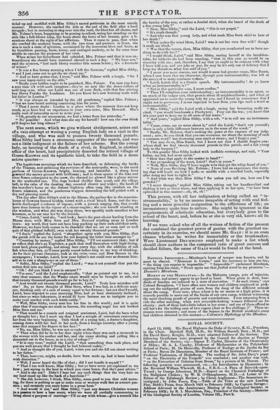NOTHING IMPOSSIBLE.—Mirabeau's haste of temper was known, and he must
be obeyed. "Monsieur he Comte," said his secretary to him one day, "the thing you require is impossible." "Impossible !" exclaimed Mirabealt, starting from his chair, "Never again use that foolish word in my presence."— Dumont's Mirabeau.
MISERY OF THE MAHRATTAS.—In the Mahratta camps, acts of injustice, oppression, and misery appear to go hand in hand. When grain is dear, hun- dreds of families are reduced to a state of starvation. "At such times," says Colonel Broughton, "I have often seen women and children employed in pick- ing out the undigested grains of corn from the dung of the different animals about the camp. Even now, when wheat is by no means at a high price, it is scarcely possible to move out of the limits of our own camp, without witnessing the most shocking proofs of poverty and wretchedness. IlYaS returning from a ride the other morning, when two miserable-looking women followed me for charity : each of them had alit& infiint in her arms ; and one of thern offered to sell her's for the trifling sum of two rupees (four or five shillings.)" These in- stances were common ; and many of the Sepoys in the British resident's camp had children obtained in this manner.—Coleman's Mythology of the Hindoos.



























 Previous page
Previous page